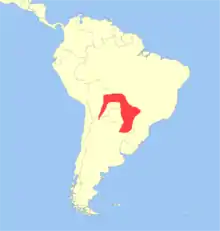Azaras's capuchin
Azaras's capuchin or hooded capuchin (Sapajus cay) is a species of robust capuchin. It occurs in eastern Paraguay, southeastern Bolivia, northern Argentina, and Brazil, at Mato Grosso do Sul and Mato Grosso states, in Pantanal.Its habitat consists of subtropical, humid, semi-deciduous, gallery forests and forested regions of the pantanals. Formerly, it was considered a subspecies of black-striped capuchin, according to Groves (2005) with the name Cebus libidinosus paraguayanus, but Silva Jr. (2001) considered it a separated species. They are considered as frugivores-insectivores which means that their diet mainly consists of a variety of fruits, seeds, arthropods, frogs, small mammals, etc.[1][2]
| Azaras's capuchin[1] | |
|---|---|
 | |
| Azaras's capuchin in the Pantanal, Brazil | |
| Scientific classification | |
| Kingdom: | Animalia |
| Phylum: | Chordata |
| Class: | Mammalia |
| Order: | Primates |
| Suborder: | Haplorhini |
| Infraorder: | Simiiformes |
| Family: | Cebidae |
| Genus: | Sapajus |
| Species: | S. cay |
| Binomial name | |
| Sapajus cay | |
 | |
| Range | |
| Synonyms | |
|
Cebus libidinosus paraguayanus Fischer, 1829 [4] | |
Notes
- Lynch Alfaro, J.W.; Silva, J.S. & Rylands, A.B. (2012). "How Different Are Robust and Gracile Capuchin Monkeys? An Argument for the Use of Sapajus and Cebus". American Journal of Primatology. 74 (4): 1–14. doi:10.1002/ajp.22007. PMID 22328205.
- Wallace, R.B. (2015). "Sapajus cay". IUCN Red List of Threatened Species. 2015: e.T136366A70612036. doi:10.2305/IUCN.UK.2015-1.RLTS.T136366A70612036.en.
- Rímoli, J., Ludwig, G., Lynch Alfaro, J., Melo, F., Mollinedo, J. & dos Santos, M. 2018. Sapajus cay. The IUCN Red List of Threatened Species 2018: e.T136366A70612310. https://doi.org/10.2305/IUCN.UK.2018-2.RLTS.T136366A70612310.en
- Global Biodiversity Information Facility (GBIF) for Sapajus cay (Illiger, 1815)
| Wikimedia Commons has media related to Cebus cay. |
